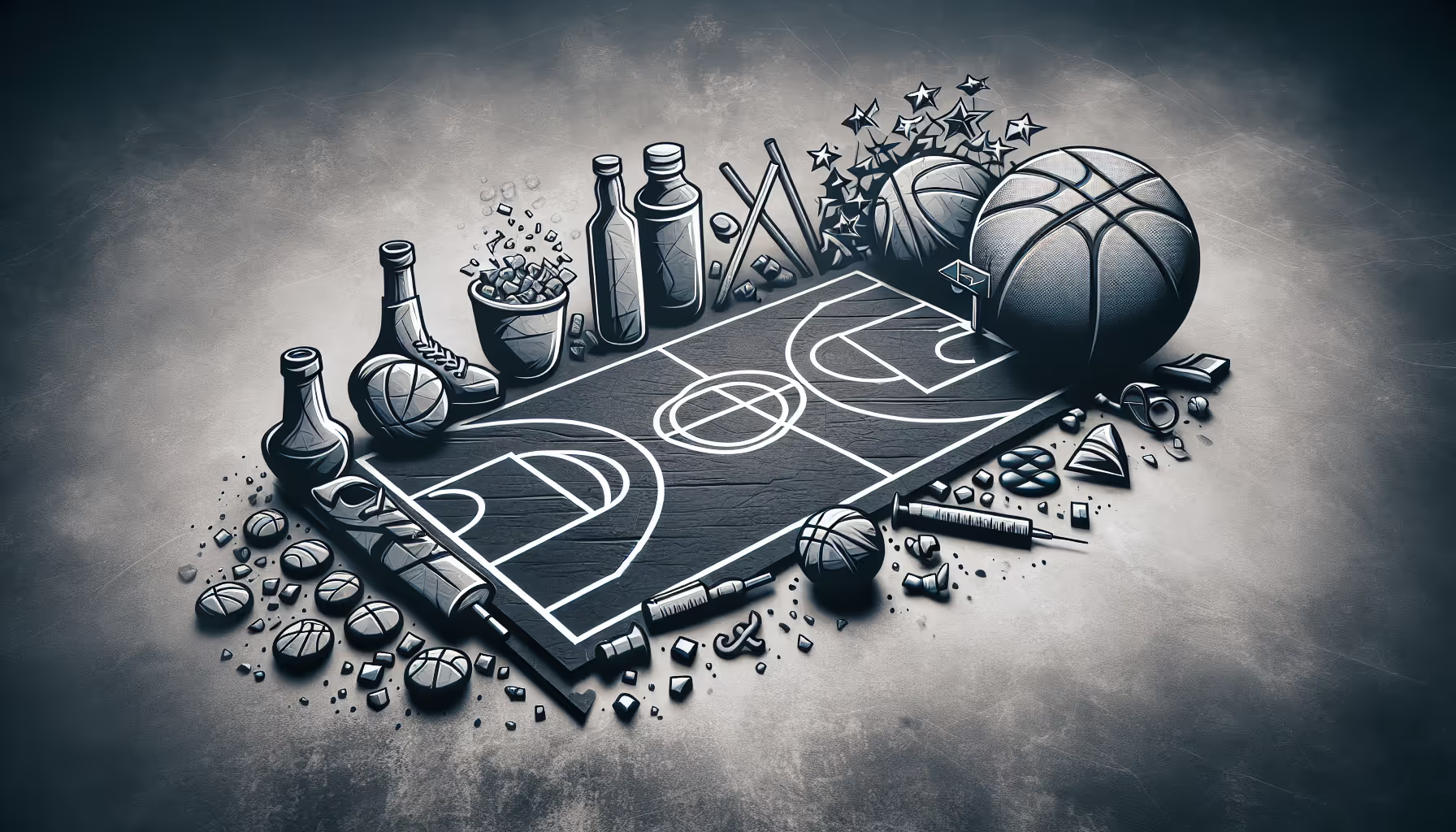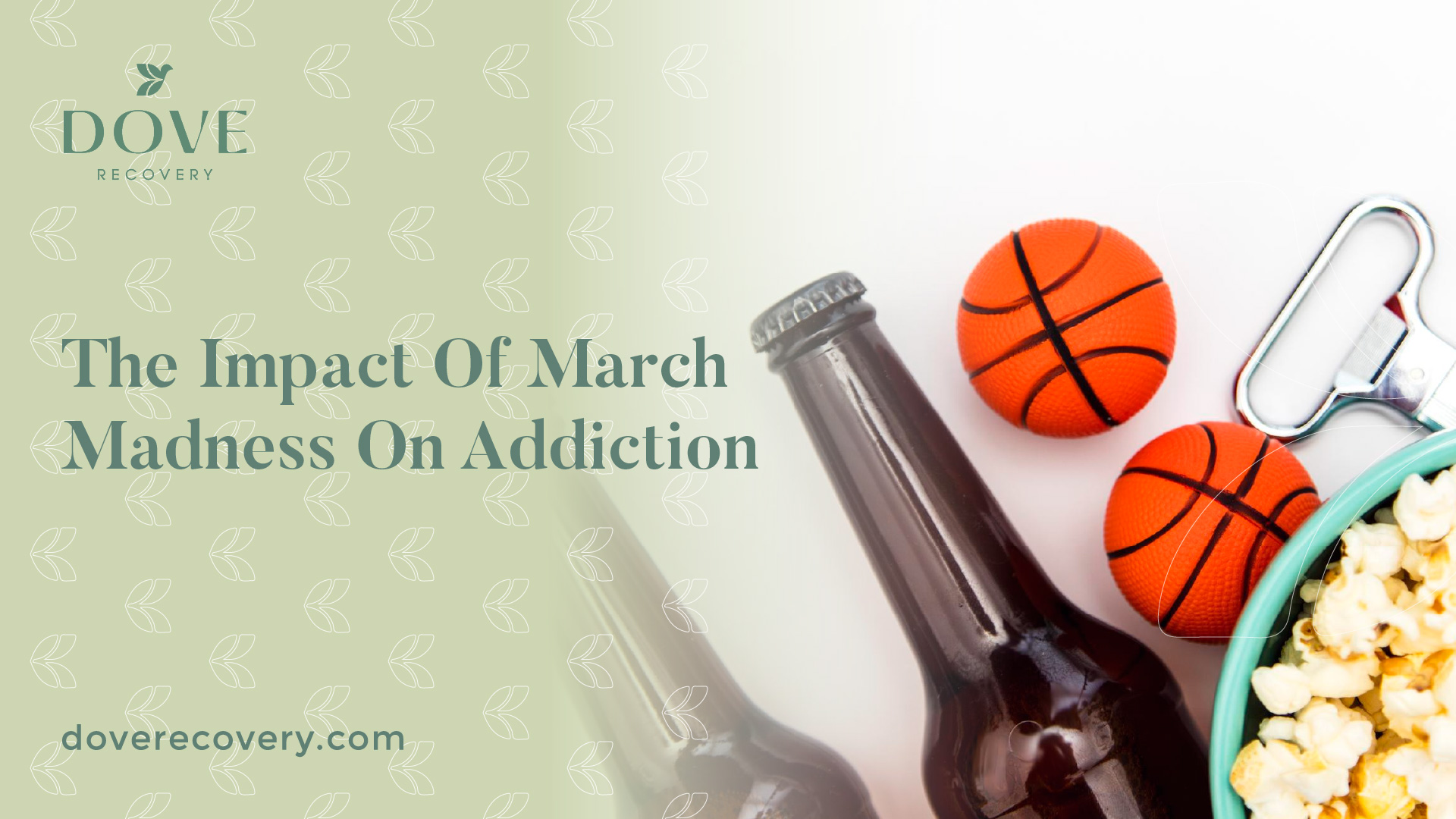The Impact Of March Madness On Addiction

Understanding Alcohol Addiction
Before diving into the impact of March Madness on addiction, it's crucial to have a fundamental understanding of alcohol addiction. This involves examining what addiction is and the factors that contribute to it.
Definition of Addiction
Addiction is a chronic disease characterized by compulsive or uncontrollable use of a substance, despite harmful consequences. It involves changes in the brain's functioning, leading to changes in behavior. Alcohol addiction, specifically, involves an intense focus on alcohol, making it difficult for individuals to control their consumption. Over time, more alcohol is needed to achieve the same effect, leading to higher consumption levels and often resulting in addiction.

Factors Contribiting to Addiction
There are several factors that contribute to the development of alcohol addiction. These include:
- Genetics: Research shows that genetics play a significant role in the development of alcohol addiction. Individuals who have close relatives with alcohol addiction are more likely to develop the disease themselves.
- Environment: Environmental factors, such as exposure to alcohol at a young age, peer pressure, and exposure to stressful life events, can increase the risk of developing alcohol addiction.
- Mental Health: Mental health conditions, such as depression, anxiety, and PTSD, can contribute to alcohol addiction. Using alcohol to cope with these conditions can lead to dependency.
- Social and Cultural Factors: Cultural norms and societal expectations can also drive alcohol consumption and potentially lead to addiction. Events that encourage drinking, such as March Madness, can contribute to this risk.
Understanding these factors can be helpful in recognizing the risk of developing alcohol addiction and in identifying strategies to mitigate this risk. As we explore the impact of March Madness on addiction, these factors will provide necessary context for understanding how such events can influence addiction behaviors.
Impact of March Madness
March Madness, the annual college basketball tournament, is not just a sporting spectacle but also a social event that can have a profound impact on alcohol-related behaviors and consumption. Understanding the influence of such events is crucial when discussing addiction and its prevention.
Influence on Addiction Behaviors
Major sporting events like March Madness can significantly influence addiction behaviors. The excitement, social pressure, and celebratory atmosphere associated with the event can lead to increased alcohol consumption. For individuals already struggling with alcohol abuse or addiction, these changes in social norms and expectations can exacerbate their drinking behaviors.
The impact of March Madness on addiction can be seen in various ways. For example, individuals may drink more than usual during the games, or use the event as an excuse to consume alcohol. They may also engage in binge drinking, defined as consuming multiple drinks within a short time frame, which is a common behavior during such events.
Moreover, individuals with a predisposition to addiction may find it difficult to resist the increased availability and social acceptance of alcohol during March Madness. This can trigger relapses in those who are in recovery or increase the risk of developing an addiction in those who are vulnerable.
Increased Alcohol Consumption
During March Madness, there is often a marked increase in alcohol consumption. The tournament, which lasts for several weeks, features multiple games every day. The constant stream of games provides many opportunities for people to gather and consume alcohol, sometimes in excessive amounts.
Increased alcohol consumption during March Madness is not confined to the venues hosting the games. Viewing parties at homes, bars, and other venues also contribute to the spike in alcohol use during the tournament. The consumption is often driven by drinking games, peer pressure, and the desire to celebrate or commiserate based on the outcomes of the games.
While occasional moderate drinking is generally considered safe, the heavy drinking associated with events like March Madness can be harmful. It can lead to immediate risks such as accidents and injuries, as well as long-term health problems like liver disease and addiction. Therefore, it's important to understand and address the impact of March Madness on addiction as part of broader efforts to promote responsible drinking and prevent alcohol abuse.
Recognizing Addiction Signs
In the context of alcohol addiction, especially during events like March Madness, it's crucial to recognize the signs and symptoms. Early recognition can lead to timely intervention and treatment, reducing the impact of march madness on addiction. These signs can be broadly categorized into physical symptoms and behavioral signs.
Physical Symptoms
Physical symptoms of alcohol addiction may vary from person to person, but there are common signs that indicate a person might be struggling. These include:
- Frequent hangovers or withdrawal symptoms, like shaking, sweating, or nausea.
- Increased tolerance to alcohol, leading to the need for more drinks to feel the same effects.
- Unexplained injuries or accidents.
- Neglected appearance or lack of concern about personal hygiene.
- Changes in sleep patterns, such as insomnia or oversleeping.
Behavioral Signs
Behavioral signs, on the other hand, can reveal changes in a person's actions, habits, or attitudes. Some common behavioral signs include:
- Drinking in secret or alone.
- Neglecting responsibilities at work, school, or home.
- Experiencing legal problems related to alcohol use.
- Showing signs of irritability, depression, or other mood changes when not drinking.
- Making unsuccessful attempts to cut down or stop drinking.
Recognizing these signs in oneself or a loved one can be the first step in seeking help for addiction. It's important to approach the situation with empathy and understanding, as addiction is a complex disease that requires professional treatment and support.
Seeking Help for Addiction
Recognizing the impact of March Madness on addiction is the first step. The next crucial step is seeking help. There are numerous treatment options available, each with different approaches and benefits.
Treatment Options
Treatment for alcohol addiction varies depending on the individual's specific needs, but often involves a combination of detoxification, therapy, medication, and aftercare.
- Detoxification: This is usually the first step in treating alcohol addiction. It involves clearing the body of alcohol and managing withdrawal symptoms.
- Therapy: Various types of therapy can be beneficial in treating alcohol addiction. Cognitive-behavioral therapy, family therapy, motivational interviewing, and other types of therapy can help individuals understand their addiction and develop coping strategies.
- Medication: Certain medications can help manage the physical symptoms of addiction and withdrawal. These should always be used under the guidance of a healthcare professional.
- Aftercare: This involves ongoing support to prevent relapse, including therapy, support groups, and sober living arrangements.
Support Systems
In addition to professional treatment, having a strong support system can play a crucial role in overcoming addiction. Here are some ways to build a support system:
- Support Groups: Groups like Alcoholics Anonymous (AA) provide a supportive community of individuals who understand the struggles of addiction.
- Family and Friends: Loved ones can provide emotional support and practical help during the recovery process.
- Healthcare Professionals: Regular check-ins with doctors and therapists can help monitor progress and adjust treatment as needed.
Remember, seeking help is a sign of strength. If you or someone you know is struggling with addiction, especially during events like March Madness, don't hesitate to reach out to healthcare professionals or support groups. They can provide the necessary tools and resources to manage addiction and pave the way to recovery.
Preventing Addiction
Preventing addiction is a multifaceted effort that includes education and awareness as well as the establishment of healthy coping mechanisms. Understanding the impact of events like March Madness on addiction can help individuals and communities create effective strategies to prevent addiction.
Education and Awareness
Educating oneself about the nature of addiction, its causes, and its effects is crucial in prevention efforts. This involves understanding that addiction is a complex disease that can be influenced by a variety of factors including genetic predisposition, environmental factors, and personal behaviors. Education can also help debunk common myths about addiction, such as the notion that it is a result of moral failure or lack of willpower.
Awareness about the impact of events like March Madness on addictive behaviors can also play a key role in prevention. For instance, recognizing that increased social drinking during such events may result in escalated consumption among susceptible individuals can help one stay vigilant.
Conducting awareness programs about the potential risks associated with increased alcohol consumption during such events can be a powerful preventive measure. These programs can provide information about the signs of addiction, the dangers of excessive drinking, and the importance of seeking help when needed.
Healthy Coping Mechanisms
Establishing healthy coping mechanisms is another important aspect of addiction prevention. These mechanisms can serve as alternatives to substance use when dealing with stress or emotional discomfort.
Physical activities like exercise and sports can be effective in reducing stress and promoting overall well-being. Similarly, engaging in hobbies, pursuing interests, and connecting with loved ones can also provide emotional support and distraction from potential triggers.
Mindfulness practices, such as meditation and yoga, can also be beneficial in managing stress and fostering a greater sense of self-awareness. These practices can help individuals recognize potential triggers and respond to them in a more constructive way.
Professional counseling can also be a valuable resource for individuals seeking to establish healthier coping mechanisms. Counselors can provide strategies for managing stress, dealing with emotional discomfort, and avoiding triggers.
By combining education, awareness, and healthy coping mechanisms, individuals and communities can work towards preventing addiction, ensuring that events like March Madness can be enjoyed responsibly and safely.
References
[1]: https://www.stepstorecovery.com/blog/the-impact-of-march-madness-on-addiction/
[2]: https://www.clintonherald.com/opinion/columns/march-madness-can-equal-march-mayhem-if-you-gamble-too-much/article_541344fa-e19b-11ee-af0f-7742f3c9a529.html
[3]: https://www.sciencedaily.com/releases/2007/03/070315220805.htm
[4]: https://cascobayrecovery.com/march-madness-in-addiction-recovery/
[5]: https://www.promises.com/addiction-blog/march-madness-road-to-gambling-addiction/
